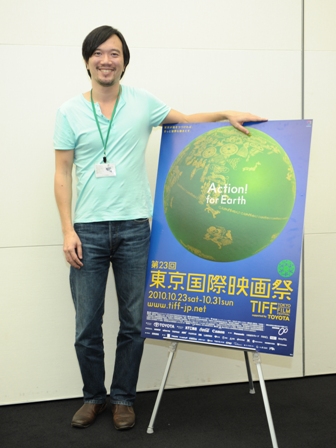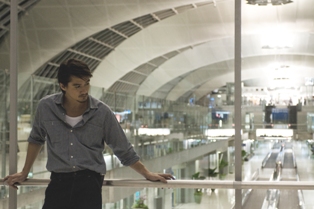2010.10.26
[Interviews]
Winds of Asia ŌĆ£Hi-SoŌĆØ Interview with Aditya Assarat (Director) 10/26


©2010 TIFF
---What motivated you to make ŌĆ£Hi-SoŌĆØ?
In fact, I have been cherishing the idea for 7 or 8 years. It should have been my first film, but I could not raise the funds. It was easier to make ŌĆ£Wonderful TownŌĆØ (in terms of s budget), and I put away this project. But I always wanted to do this sooner or later.
---The main character, who comes back from studying in the U.S. to Thailand to become a film actor, overlaps with you a lot.
I agree 100%. I was a foreigner in the U.S., but I am treated as a foreigner and called American boy in Thailand. I donŌĆÖt feel quite at home anywhere. I am too westernized as an Asian, but too Asian to be a Westerner. I wanted to show this in the film.
--- Gaps slowly develop between the main character and his American girlfriend who comes to Thailand. Did this happen to you?
Yes, exactly. (laughs)
---His relationship with a new Thai girlfriend does not work out either. The script portrays the subtleties of this feeling very well. What did you keep in mind when writing the script?
It consists of two parts, each side corresponds to the other side like a coupled mirror. It is like a love story in an English version and a Thai version. The common concept is that the romantic relationship does not work out in either of the cases.
---It was filmed again in the area which was devastated by the Asian Tsunami in 2004, following {Wonderful Town}. What was your intention?
I was living in Bangkok when it happened. The damage was in southern Thailand so I watched it on TV. When I went to the area a year later, everything was tidied up without any trace. It looked as if nothing had happened, but it cannot be erased from peopleŌĆÖs memory. That gave me the starting point for ŌĆ£Wonderful Town.ŌĆØ I wanted to give some kind of a link between my first and second films, hence ŌĆ£Hi-SoŌĆØ has an actor who comes to act in the area which was hit by the tsunami.

©2010 TIFF
---The last scene at the airport can be interpreted in many ways.
There are a few ways to interpret it, but to me, the significance is that it is at the airport. Airports and hotels are international as well as stateless, a place where people like Ananda, who donŌĆÖt belong to any place, can feel at ease. It a reflection of my life as I have spent a lot of my time at airports and hotels.ŌĆØ
---Do you still feel you are an outsider?
My 70-year-old father was also educated in the U.S. and had a similar upbringing as I have had. My father still says he doesnŌĆÖt feel Thailand is his country. I wonder if that feeling will remain with me for life.
Apichatpong Weerasethakul received the Palme dŌĆÖOr at Cannes this year for the first time for a Thai film. Did you feel inspired?
As someone who makes independent films, I know exactly how significant his achievement is, and it was really inspiring. I have huge respect for him for making films which express will, emotion and persuasion. ŌĆ£
---You seem to have established your style only in your second film. What themes are you interested in for the future?
Building up my career as a film director is in itself a challenge for me, and I have not succeeded yet to make a film that appeals to a wider audience. I donŌĆÖt think I would ever make a film like Tony JaaŌĆÖs which are watched by so many people, but I would like to make a film, in my own style, that would reach out to as many people as possible.
---ItŌĆÖs been two years since you were in Tokyo. Are you enjoying it here?
I love being in Japan. My favourite is the hot springs. I have been to a hot spring twice already.
Assarat acknowledges being a foreigner and faces it head-on through films. His matter-of-fact manner of talking relates to his films, with a glimpse of a firm belief in direction. ŌĆ£Hi-SoŌĆØ will surely spread its wings from Tokyo to the world stage.
(Interviewed by Gen Suzuki)
Hi-So

©Pop Pictures Co.,Ltd




